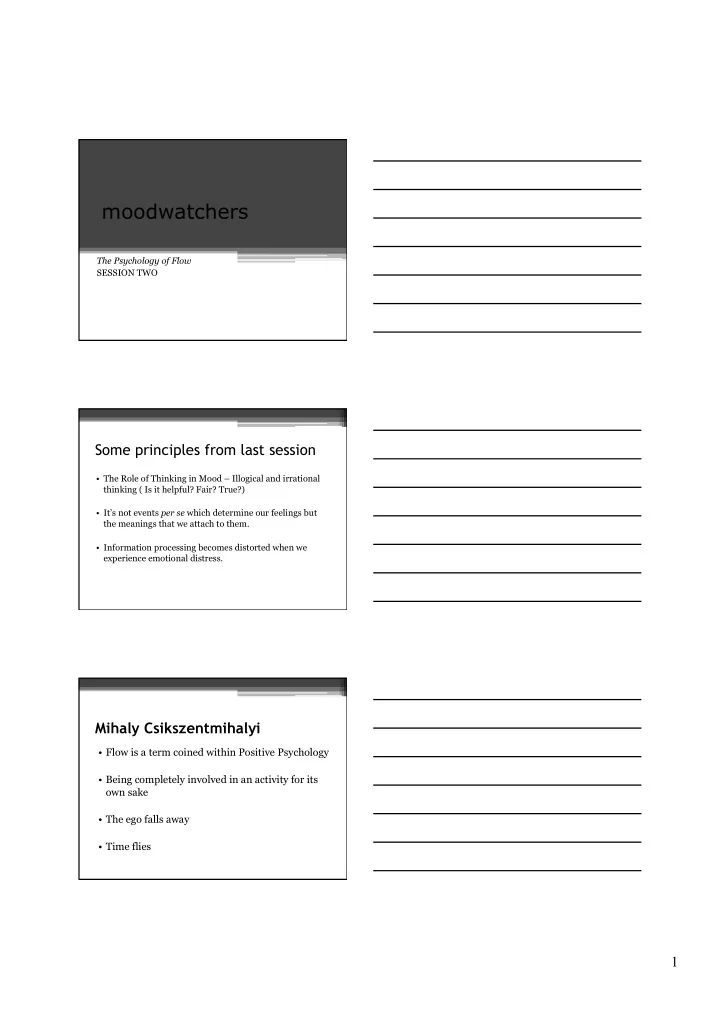

moodwatchers The Psychology of Flow SESSION TWO Some principles from last session • The Role of Thinking in Mood – Illogical and irrational thinking ( Is it helpful? Fair? True?) • It’s not events per se which determine our feelings but the meanings that we attach to them. • Information processing becomes distorted when we experience emotional distress. Mihaly Csikszentmihalyi • Flow is a term coined within Positive Psychology • Being completely involved in an activity for its own sake • The ego falls away • Time flies 1
• A state of complete absorption in a complex and challenging activity that stretches one’s skills. • Csikszentmihalyi has made the exploration of flow the centerpiece of his career because he believes that being in flow generates the peak experiences in our lives. • The more flow we experience, he suggests, the happier we are. • Recent studies have shown that life satisfaction and happiness correlate with better health and improved longevity (Veenhoven 2006). • Not only does happiness feel good, but happy people are more likely to engage in healthy behaviours, and experience less illness. So what are the characteristics of a flow experience? • They include clear goals, decisiveness, the merging of action and awareness, complete (yet effortless) concentration, a sense of control, loss of self- consciousness, an altered sense of time, immediate feedback and an autotelic emphasis (Csikszentmihalyi 1993; Nakamura & Csikszentmihalyi 2002). • The word autotelic is used to describe experiences where one is focused solely on the activity itself, not on how it will affect one’s ego 2
• Having plenty of flow experiences in our lives enhances our well-being, yet in a German study only 23% of people surveyed said they often experienced flow and 40% rarely or never had flow experiences (Csikszentmihalyi 1997). • Especially crucial for children and adolescents to develop skills and activities that produce flow, bringing life satisfaction, self-esteem and efficacy early in life. Flow examples • Toy soldiers • Piano • Old man in the cottage • The manicurist • Two brothers • The surgeon FLOW • Doing things you love • Doing things you’re good at • Starting new things • Being stretched • Being positively selfish 3
The right balance • Over-skilled – Bored • Under-skilled – stressed • Being stretched The eight ingredients of flow • The experience occurs usually when we are involved in tasks that we have a good chance of completing. • We are able to concentrate fully on the activity. • The task has clear goals. • The task is such that it gives us immediate feedback on how well we are doing. The eight ingredients of flow • Our involvement is ‘deep but effortless’ and this ‘removes from awareness the worries and frustrations of everyday life’. • There is a sense of exercising a sense of control over our actions. • ‘Concern for the self disappears’ but paradoxically our ‘sense of self emerges stronger after the flow experience is over’. • We lose our normal sense of time – we can feel either that is has speeded up (and passed quickly) or slowed down. 4
STRESS BUSTER FOR THIS WEEK • FLOW • Two New Syndromes • Serious Boring Person Syndrome • Serious Busy Person Syndrome For next week • 2 STRESS BUSTERS IN OPERATION • APPLYING – TAPPING INTO YOUR OWN INTERNAL DIALOGUE • THE TWO QUESTIONS 5
Recommend
More recommend